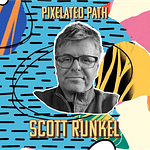In the latest episode of Pixelated Path, I had the pleasure of speaking with Jen Wong, a senior designer at Netflix, on a fascinating journey. From starting a nonprofit in college to making bold career moves in the tech industry, Jen’s story is a testament to the power of authenticity and following one’s passion.
Discovering Design Through Nonprofit Work
Jen’s entry into the world of design wasn’t traditional. While studying sociology at UCLA, she strongly desired to make a difference. She started a nonprofit focused on foster care children called “Fosterity and Beyond.” Lacking resources, she took it upon herself to learn design tools through LinkedIn Learning (formerly Lynda.com), creating logos and websites to support her cause.
“I was learning a bunch of skills because I couldn’t hire anyone and didn’t have the funds,” Jen recalls. This hands-on approach ignited her interest in design and user experience (UX).
The Importance of Authenticity
Growing up in various households, Jen often felt like a diluted version of herself. It wasn’t until she pursued her genuine interests that she began to thrive.
“When you’re yourself, you shine. People see it,” she emphasizes. Jen believes authenticity enhances personal happiness and allows others to genuinely connect with you.
Bold Career Moves and Entrepreneurship
Despite securing a coveted position at Dropbox, Jen felt unfulfilled. Her passion for nonprofit work and social entrepreneurship led her to make a daring decision: leaving Dropbox to pursue further education at UC Berkeley.
“I wanted to break my own status quo and enter into the world of entrepreneurship,” she explains. This move allowed her to engage in projects that truly resonated with her despite the uncertainty and financial instability that often comes with startups.
Managing Mental Health and Self-Validation
Jen candidly discussed her struggles with mental health, particularly anxiety and the challenges of high-pressure environments. She highlighted the importance of self-validation over seeking external approval.
“I realized I wasn’t validating myself. I was always seeking external validation,” she notes. She found a healthier balance in her professional life by maintaining a “work wins” diary and focusing on personal achievements.
Thriving as a Senior Designer at Netflix
At Netflix, Jen found an environment that satisfied her entrepreneurial spirit within a larger organization. She is surrounded by talented colleagues and continues to learn and grow in her role.
She emphasizes taking initiative, even on small projects. She encourages designers to dig deeper into problems rather than just doing what they’re told.
“You can make any tiny thing inspiring. It’s how you sell it and what you make of it,” she says.
Navigating ADHD in the Workplace
Jen also opened up about her experiences with ADHD and how it influences her work style. She thrives in fast-paced environments and uses strategies like setting personal deadlines and focusing on passion projects to stay engaged.
“I need to be strategic about filling that time with things I want to do,” she advises. Recognizing her needs has been crucial in managing her mental health and maintaining productivity.
Embracing AI and the Future of UX Design
When it comes to AI, Jen is optimistic. She frequently uses tools like ChatGPT and Copilot as soundboards. She believes AI can handle some execution work, allowing designers to focus more on strategic and creative tasks.
“Designers should be responsible for designing algorithms or GPT prompts,” she asserts. She encourages designers to adapt by learning prompt engineering and integrating AI into their workflows.
Advice for Aspiring Designers
For those entering the field, Jen emphasizes the importance of:
Product Strategy: Develop a strong understanding of how design decisions impact the overall product and business goals. Jen advises designers to think beyond aesthetics by considering feasibility, prioritization, and collaborating closely with product managers and engineers.
Self-Reflection: Regularly assess your own skills and mindset. Jen emphasizes moving away from a victim mentality and focusing on personal growth by identifying areas for improvement and actively working to address them.
Building Skills: Enhance your design abilities by focusing on visual polish, storytelling, and practical skills. Jen suggests seeking constructive feedback to refine your work and continually learning to stay competitive.
Networking: Build genuine connections rather than relying on generic outreach. Jen recommends personalizing your interactions to foster meaningful relationships that can support your professional journey.
“Think about what you can do to be a better designer,” she suggests. Designers can navigate the challenging job market more effectively by focusing on actionable steps and personal development.
Conclusion
Jen Wong’s journey is a compelling example of how authenticity, mental health awareness, and a willingness to take risks can lead to a fulfilling career. Her insights offer valuable lessons for designers at any stage of their careers.
Watch the Full Episode
Tune in to the full episode of Pixelated Path to learn more about Jen's experiences and insights.
If you enjoyed this episode, don’t forget to subscribe to Pixelated Path for more inspiring stories and practical advice from leaders in the UX design industry.
✌️













Share this post